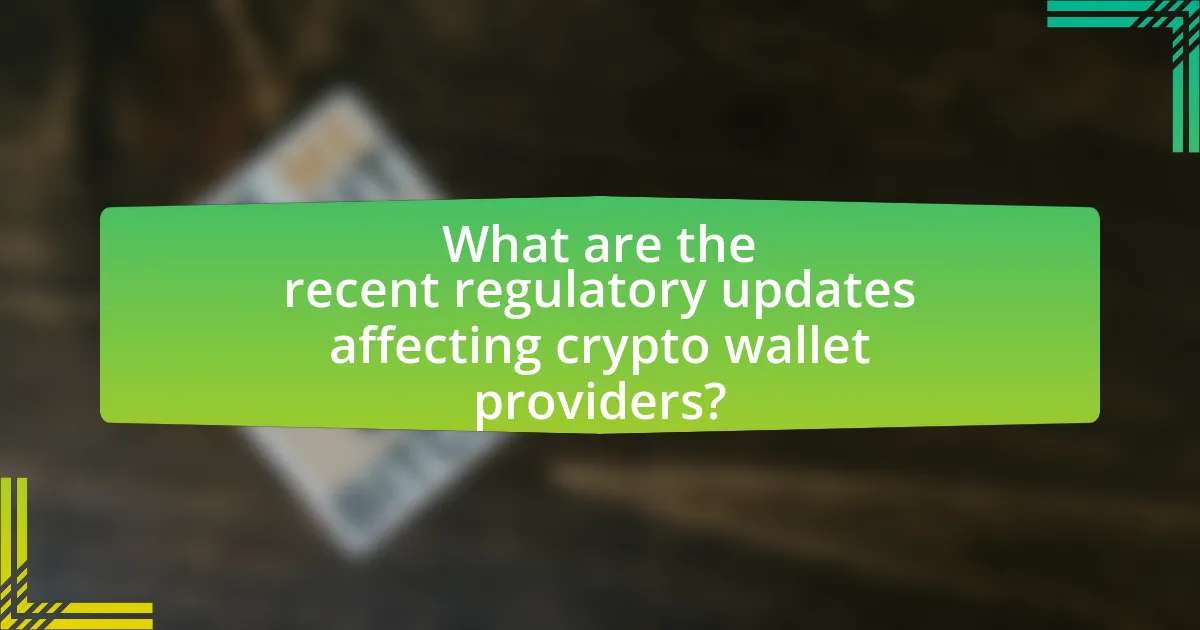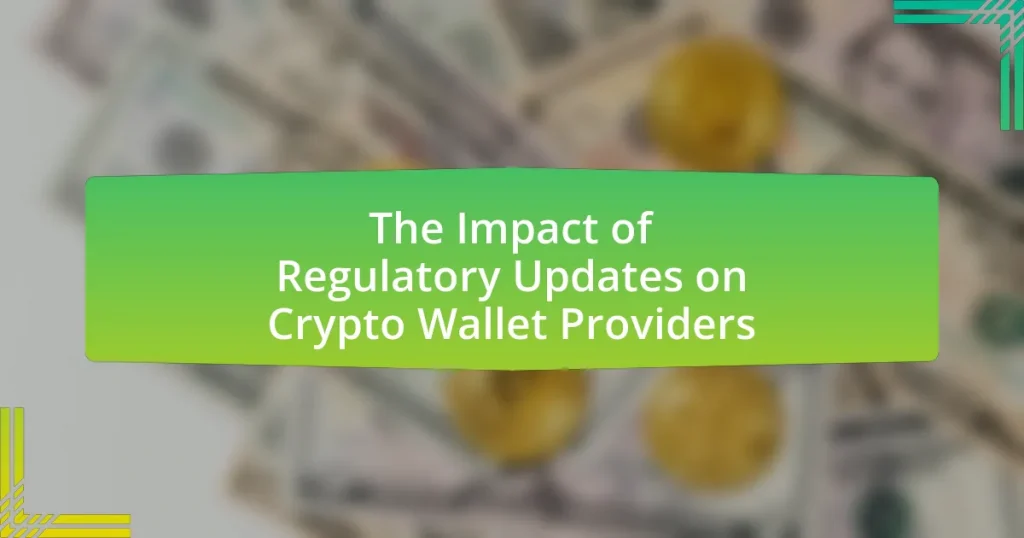The article examines the impact of recent regulatory updates on crypto wallet providers, focusing on guidelines from the Financial Action Task Force (FATF) and the European Union’s Markets in Crypto-Assets (MiCA) regulation. It highlights the varying regulatory landscapes across regions, particularly in the United States and Europe, and discusses specific compliance requirements such as Know Your Customer (KYC) and Anti-Money Laundering (AML) protocols. The article also addresses the challenges faced by wallet providers in adapting to these regulations, the potential long-term effects on the industry, and best practices for maintaining compliance and user trust amidst evolving regulatory scrutiny.

What are the recent regulatory updates affecting crypto wallet providers?
Recent regulatory updates affecting crypto wallet providers include the implementation of the Financial Action Task Force (FATF) guidelines, which require enhanced customer due diligence and transaction monitoring. These guidelines mandate that wallet providers collect and share user information for transactions exceeding a certain threshold, aiming to combat money laundering and terrorist financing. Additionally, the European Union’s Markets in Crypto-Assets (MiCA) regulation, set to be fully enforced by 2024, introduces a comprehensive framework for crypto asset service providers, including wallet providers, focusing on consumer protection and market integrity. These updates reflect a global trend towards stricter oversight of the cryptocurrency sector, emphasizing compliance and security measures.
How do these regulatory updates vary across different regions?
Regulatory updates for crypto wallet providers vary significantly across regions due to differing legal frameworks and enforcement practices. For instance, the European Union has implemented the Markets in Crypto-Assets (MiCA) regulation, which aims to create a unified regulatory framework across member states, enhancing consumer protection and market integrity. In contrast, the United States has a more fragmented approach, with regulations varying by state; for example, New York’s BitLicense imposes stringent requirements on crypto businesses, while other states may have more lenient regulations. Additionally, countries like China have imposed outright bans on cryptocurrency transactions, while regions such as Singapore have adopted a more favorable stance, encouraging innovation through clear regulatory guidelines. These variations reflect each region’s economic priorities, risk tolerance, and approach to technological innovation in the financial sector.
What specific regulations have been implemented in the United States?
The specific regulations implemented in the United States regarding crypto wallet providers include the Financial Crimes Enforcement Network (FinCEN) regulations, which require these providers to register as money services businesses (MSBs) and comply with anti-money laundering (AML) and know your customer (KYC) requirements. Additionally, the Securities and Exchange Commission (SEC) has established guidelines that classify certain cryptocurrencies as securities, impacting how crypto wallet providers must operate in relation to these assets. The Commodity Futures Trading Commission (CFTC) also regulates derivatives trading involving cryptocurrencies, further influencing the operational landscape for wallet providers. These regulations aim to enhance consumer protection and mitigate risks associated with cryptocurrency transactions.
How do European regulations differ from those in Asia?
European regulations on crypto wallet providers are generally more stringent and comprehensive compared to those in Asia. In Europe, the Markets in Crypto-Assets (MiCA) regulation aims to create a unified regulatory framework across member states, focusing on consumer protection, anti-money laundering (AML), and market integrity. In contrast, many Asian countries have varied approaches; for instance, while Japan has a robust regulatory framework for cryptocurrencies, other nations like China have imposed outright bans on crypto activities. This disparity in regulatory approaches affects compliance requirements, operational costs, and market access for crypto wallet providers operating in these regions.
What are the primary goals of these regulatory updates?
The primary goals of these regulatory updates are to enhance consumer protection, ensure financial stability, and prevent illicit activities within the cryptocurrency ecosystem. These updates aim to establish clear guidelines for crypto wallet providers, which helps mitigate risks associated with fraud and money laundering. For instance, regulations often require wallet providers to implement Know Your Customer (KYC) and Anti-Money Laundering (AML) protocols, thereby increasing transparency and accountability in transactions.
How do these regulations aim to enhance consumer protection?
Regulations aim to enhance consumer protection by establishing clear standards for security, transparency, and accountability in crypto wallet services. These regulations require providers to implement robust security measures, such as encryption and multi-factor authentication, to safeguard user funds against theft and fraud. Additionally, they mandate transparent disclosure of fees, risks, and terms of service, enabling consumers to make informed decisions. For instance, the Financial Action Task Force (FATF) guidelines emphasize the importance of anti-money laundering (AML) practices, which help protect consumers from illicit activities associated with their transactions. By enforcing these standards, regulations create a safer environment for consumers engaging with crypto wallet providers.
What measures are being taken to prevent money laundering and fraud?
Regulatory updates are implementing stringent measures to prevent money laundering and fraud in the cryptocurrency sector. These measures include Know Your Customer (KYC) protocols, which require wallet providers to verify the identities of their users, and Anti-Money Laundering (AML) compliance programs that monitor transactions for suspicious activity. For instance, the Financial Action Task Force (FATF) has established guidelines that mandate crypto service providers to report large transactions and suspicious activities, enhancing transparency and accountability. Additionally, many jurisdictions are enforcing stricter licensing requirements for crypto wallet providers, ensuring they adhere to national and international regulations aimed at curbing illicit financial activities.

How do regulatory updates impact the operations of crypto wallet providers?
Regulatory updates significantly impact the operations of crypto wallet providers by imposing new compliance requirements and operational constraints. These updates can necessitate changes in how wallet providers manage user data, conduct transactions, and implement security measures. For instance, the Financial Action Task Force (FATF) introduced the “Travel Rule,” which requires wallet providers to share customer information for transactions above a certain threshold, thereby increasing the operational burden on these providers to ensure compliance. Additionally, regulatory changes can affect the availability of services in certain jurisdictions, as providers may need to obtain licenses or adapt their offerings to meet local laws, which can lead to increased costs and operational complexity.
What changes must wallet providers implement to comply with new regulations?
Wallet providers must implement enhanced KYC (Know Your Customer) and AML (Anti-Money Laundering) procedures to comply with new regulations. These changes require wallet providers to verify the identities of their users, monitor transactions for suspicious activity, and report any irregularities to regulatory authorities. For instance, the Financial Action Task Force (FATF) has set guidelines that mandate virtual asset service providers, including wallet providers, to adhere to strict customer verification processes and transaction monitoring to prevent illicit activities.
How do these changes affect user verification processes?
Regulatory updates significantly enhance user verification processes by imposing stricter compliance requirements on crypto wallet providers. These changes necessitate the implementation of more robust Know Your Customer (KYC) protocols, which include thorough identity verification measures such as government-issued ID checks and biometric authentication. For instance, the Financial Action Task Force (FATF) guidelines mandate that crypto service providers verify the identity of their users to prevent money laundering and terrorist financing. Consequently, these regulations lead to increased scrutiny of user identities, thereby improving the overall security and integrity of the verification process.
What adjustments are needed in transaction monitoring systems?
Transaction monitoring systems need to enhance their algorithms to better detect suspicious activities and improve data analytics capabilities. These adjustments are essential due to the evolving regulatory landscape that requires more stringent compliance measures. For instance, the Financial Action Task Force (FATF) has emphasized the need for real-time monitoring and reporting of transactions, particularly in the cryptocurrency sector, to combat money laundering and terrorist financing. Additionally, integrating machine learning techniques can help in identifying patterns and anomalies more effectively, thereby increasing the accuracy of alerts generated by these systems.
What challenges do wallet providers face in adapting to these regulations?
Wallet providers face significant challenges in adapting to regulatory updates, primarily due to the need for compliance with diverse and evolving legal frameworks. These challenges include the complexity of understanding and implementing anti-money laundering (AML) and know your customer (KYC) requirements, which vary by jurisdiction and require substantial operational adjustments. Additionally, wallet providers must invest in technology upgrades to ensure secure data handling and reporting mechanisms, which can be costly and time-consuming. The risk of non-compliance also poses a threat, as violations can lead to severe penalties, including fines and loss of operating licenses. Furthermore, the rapid pace of regulatory changes can create uncertainty, making it difficult for wallet providers to develop long-term strategies.
How do compliance costs affect the profitability of wallet providers?
Compliance costs significantly reduce the profitability of wallet providers by increasing operational expenses. These costs arise from adhering to regulations such as anti-money laundering (AML) and know your customer (KYC) requirements, which necessitate investments in technology, personnel, and processes. For instance, a study by the Cambridge Centre for Alternative Finance found that compliance-related expenditures can account for up to 20% of a wallet provider’s total operating costs. This financial burden can lead to reduced margins and limit the ability to invest in growth or innovation, ultimately impacting overall profitability.
What operational hurdles do providers encounter during implementation?
Providers encounter several operational hurdles during implementation, primarily related to compliance with evolving regulations. These hurdles include the need to adapt existing systems to meet new legal requirements, which can lead to increased operational costs and resource allocation challenges. For instance, a report by the Financial Action Task Force highlights that crypto wallet providers must implement robust anti-money laundering (AML) and know your customer (KYC) protocols, which require significant technological upgrades and staff training. Additionally, the lack of standardized regulations across jurisdictions complicates the implementation process, as providers must navigate varying legal landscapes, leading to potential delays and increased complexity in operations.

What are the potential long-term effects of regulatory updates on the crypto wallet industry?
Regulatory updates can significantly reshape the crypto wallet industry by enhancing security, fostering consumer trust, and promoting compliance. These updates often require wallet providers to implement stricter Know Your Customer (KYC) and Anti-Money Laundering (AML) protocols, which can lead to increased operational costs but also improve the overall security of transactions. For instance, the Financial Action Task Force (FATF) guidelines have prompted many jurisdictions to enforce regulations that require crypto wallets to collect and verify user identities, thereby reducing fraud and illicit activities. Over time, this regulatory environment may lead to a consolidation of the market, where only compliant and robust wallet providers survive, ultimately resulting in a more stable and trustworthy ecosystem for users.
How might these regulations influence market competition among wallet providers?
Regulations can significantly influence market competition among wallet providers by establishing compliance standards that can either hinder or facilitate market entry. For instance, stringent regulations may create barriers for new entrants, allowing established providers to maintain market dominance. Conversely, regulations that promote transparency and security can enhance consumer trust, potentially increasing competition as new providers enter the market to meet these standards. Historical examples, such as the implementation of the General Data Protection Regulation (GDPR) in Europe, demonstrate how regulatory frameworks can reshape competitive dynamics by compelling companies to innovate and improve their services to comply with legal requirements.
What impact could regulations have on new entrants in the market?
Regulations can significantly hinder new entrants in the market by imposing compliance costs and operational barriers. For instance, stringent Know Your Customer (KYC) and Anti-Money Laundering (AML) requirements can lead to increased expenses for startups, making it difficult for them to compete with established players who have more resources. According to a report by the Financial Action Task Force (FATF), compliance with these regulations can cost companies up to 10% of their annual revenue, which disproportionately affects smaller firms. Additionally, regulatory uncertainty can deter investment and innovation, as potential entrants may be hesitant to enter a market with unclear or evolving rules.
How do regulations shape the innovation landscape within the industry?
Regulations significantly shape the innovation landscape within the crypto wallet industry by establishing compliance frameworks that guide development and operational practices. These regulations, such as the Financial Action Task Force (FATF) guidelines and the European Union’s Anti-Money Laundering (AML) directives, compel wallet providers to implement robust security measures and customer verification processes. Consequently, this regulatory environment fosters innovation in areas like cybersecurity and user experience, as companies strive to meet compliance while enhancing their offerings. For instance, a report by Chainalysis in 2021 highlighted that firms adhering to regulatory standards experienced a 30% increase in user trust, leading to greater market adoption and technological advancements.
What best practices should crypto wallet providers adopt in response to regulatory changes?
Crypto wallet providers should adopt a proactive compliance strategy in response to regulatory changes. This includes implementing robust Know Your Customer (KYC) and Anti-Money Laundering (AML) procedures to ensure adherence to legal requirements. For instance, the Financial Action Task Force (FATF) guidelines mandate that crypto service providers verify the identity of their users, which helps mitigate risks associated with illicit activities. Additionally, wallet providers should regularly update their policies and procedures to reflect new regulations, conduct staff training on compliance, and engage with legal experts to navigate complex regulatory landscapes. By doing so, they can enhance their credibility and trustworthiness in the market, ultimately leading to better user retention and growth.
How can providers ensure ongoing compliance with evolving regulations?
Providers can ensure ongoing compliance with evolving regulations by implementing a robust compliance management system that includes continuous monitoring of regulatory changes. This system should involve regular training for staff on new regulations, utilizing compliance software to track updates, and engaging with legal experts to interpret and apply these regulations effectively. For instance, a study by the Financial Action Task Force (FATF) emphasizes the importance of adapting compliance frameworks to meet new standards, highlighting that organizations that proactively adjust their practices are less likely to face penalties.
What strategies can be employed to maintain user trust amidst regulatory scrutiny?
To maintain user trust amidst regulatory scrutiny, crypto wallet providers should prioritize transparency, robust security measures, and proactive communication. Transparency involves clearly disclosing compliance efforts and regulatory changes to users, which fosters trust. For instance, a study by the Cambridge Centre for Alternative Finance indicates that transparency in operations can significantly enhance user confidence in financial services. Implementing strong security protocols, such as two-factor authentication and regular security audits, reassures users that their assets are protected. Additionally, proactive communication about regulatory developments and how they affect users can mitigate uncertainty and reinforce trust. Regular updates through newsletters or social media can keep users informed and engaged, demonstrating the provider’s commitment to user safety and compliance.






